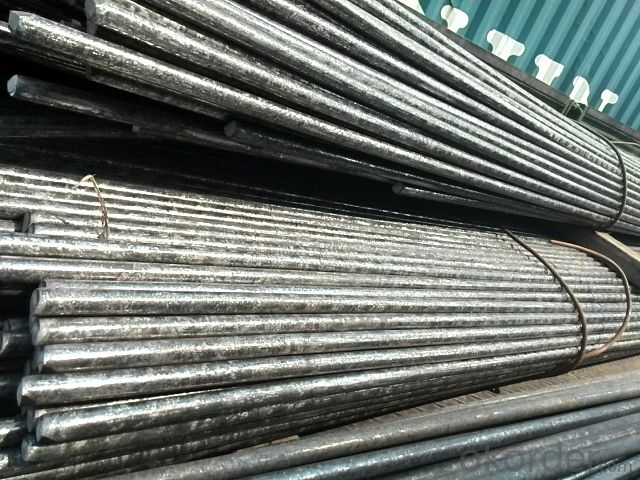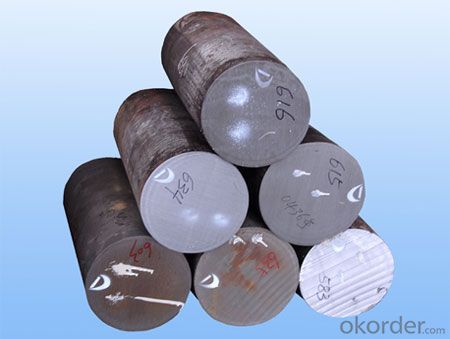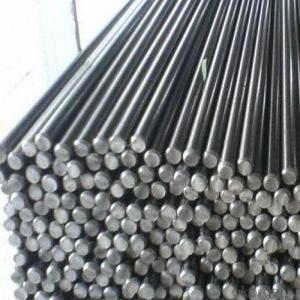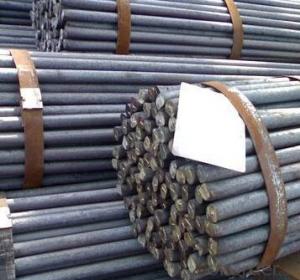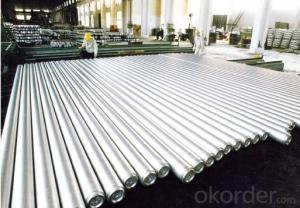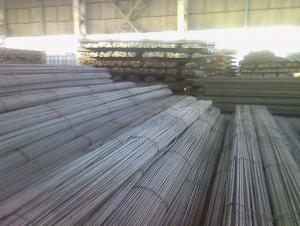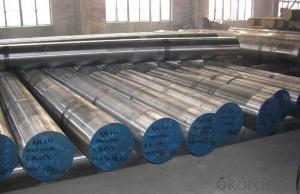Mould Special Steel 60Si2CrA
- Loading Port:
- China Main Port
- Payment Terms:
- TT or LC
- Min Order Qty:
- -
- Supply Capability:
- -
OKorder Service Pledge
OKorder Financial Service
You Might Also Like
Product Description:
OKorder is offering Mould Special Steel 60Si2CrA at great prices with worldwide shipping. Our supplier is a world-class manufacturer of steel, with our products utilized the world over. OKorder annually supplies products to European, North American and Asian markets. We provide quotations within 24 hours of receiving an inquiry and guarantee competitive prices.
Product Applications:
Mould Special Steel 60Si2CrA are ideal for structural applications and are widely used in the construction of buildings and bridges, and the manufacturing, petrochemical, and transportation industries.
Product Advantages:
OKorder's Mould Special Steel 60Si2CrA are durable, strong, and resist corrosion.
Main Product Features:
· Premium quality
· Prompt delivery & seaworthy packing (30 days after receiving deposit)
· Corrosion resistance
· Can be recycled and reused
· Mill test certification
· Professional Service
· Competitive pricing
Product Specifications:
Manufacture: Hot rolled
Grade: Q195 – 235
Certificates: ISO, SGS, BV, CIQ
Length: 6m – 12m, as per customer request
Corresponding Steel Grade for Reference:
CHN, GB | JPN, JIS | GER, DIN | GBR, BS |
60Si2CrA | SWOSC-V | 67SiCr5 | 685H57 |
USA, AISI/SAE/ASTM | ISO | ||
9254 | 55SiCr63 |
Chemical Composition:
C | Si | Mn | S |
0.52~0.60 | 1.5~2.00 | 0.60~0.90 | ≤0.035 |
P | Cr | Ni | Cu |
≤0.035 | ≤0.35 | ≤0.35 | ≤0.25 |
FAQ:
Q1: Why buy Materials & Equipment from OKorder.com?
A1: All products offered byOKorder.com are carefully selected from China's most reliable manufacturing enterprises. Through its ISO certifications, OKorder.com adheres to the highest standards and a commitment to supply chain safety and customer satisfaction.
Q2: How do we guarantee the quality of our products?
A2: We have established an advanced quality management system which conducts strict quality tests at every step, from raw materials to the final product. At the same time, we provide extensive follow-up service assurances as required.
Q3: How soon can we receive the product after purchase?
A3: Within three days of placing an order, we will begin production. The specific shipping date is dependent upon international and government factors, but is typically 7 to 10 workdays.
Q4: What makes stainless steel stainless?
A4: Stainless steel must contain at least 10.5 % chromium. It is this element that reacts with the oxygen in the air to form a complex chrome-oxide surface layer that is invisible but strong enough to prevent further oxygen from "staining" (rusting) the surface. Higher levels of chromium and the addition of other alloying elements such as nickel and molybdenum enhance this surface layer and improve the corrosion resistance of the stainless material.
Q5: Can stainless steel rust?
A5: Stainless does not "rust" as you think of regular steel rusting with a red oxide on the surface that flakes off. If you see red rust it is probably due to some iron particles that have contaminated the surface of the stainless steel and it is these iron particles that are rusting. Look at the source of the rusting and see if you can remove it from the surface.
Images:
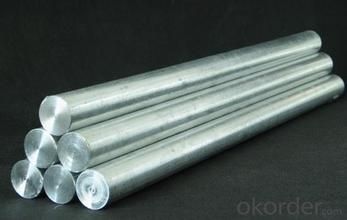
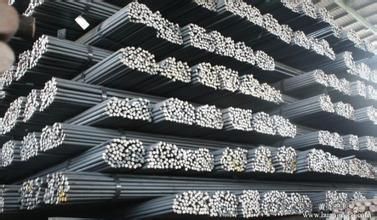
- Q: What are the considerations for selecting the right steel grade for a round bar?
- When selecting the right steel grade for a round bar, there are several considerations to take into account. Firstly, the intended application of the round bar must be evaluated, as different steel grades offer varying levels of strength, hardness, and corrosion resistance. Additionally, factors such as the desired machinability, weldability, and heat treatability should be considered. Furthermore, the environmental conditions in which the round bar will be used, such as temperature and exposure to chemicals, play a crucial role in determining the appropriate steel grade. Lastly, budget constraints and availability of the steel grade should also be taken into consideration. Overall, a thorough analysis of the application requirements and an understanding of the properties of different steel grades are key considerations in selecting the right steel grade for a round bar.
- Q: What are the environmental benefits of using steel round bars?
- There are several environmental benefits of using steel round bars. Firstly, steel is a highly recyclable material, which means that using steel round bars can help reduce the demand for new raw materials and decrease the amount of waste sent to landfills. Additionally, steel production processes have significantly improved in recent years, resulting in lower emissions of greenhouse gases and air pollutants. Steel is also durable and long-lasting, reducing the need for frequent replacements and saving valuable resources. Overall, the use of steel round bars can contribute to a more sustainable and eco-friendly construction industry.
- Q: What are the factors affecting the price of steel round bars?
- The price of steel round bars can be influenced by various factors. Firstly, the cost of raw materials plays a significant role. This includes the price of iron ore, scrap metal, and other essential components used in steel production. These prices can fluctuate based on supply and demand dynamics in the global market. Another factor is the overall demand for steel round bars. When demand is high, prices tend to increase. This can be influenced by factors such as economic growth, construction and infrastructure projects, manufacturing activities, and international trade. The production and manufacturing costs also impact the price of steel round bars. Expenses like labor, energy, transportation, and technology advancements can all contribute to the final price. Market competition is another factor that affects steel bar prices. When there are more suppliers or alternatives available in the market, prices can be driven down due to increased competition and the need to attract customers. Government regulations and policies can also play a role in pricing. Taxes, tariffs, duties, and trade regulations imposed by governments can impact the cost of steel round bars, especially in international trade scenarios. Lastly, currency exchange rates can influence the price of steel round bars. Fluctuations in currency values can make imported or exported steel products more expensive or cheaper depending on the exchange rate. Considering these factors, it is important for buyers and sellers of steel round bars to closely monitor market conditions and stay informed about any changes that may impact prices.
- Q: Can steel round bars be customized or fabricated?
- Yes, steel round bars can be customized or fabricated to meet specific requirements. Steel round bars are commonly used in various industries such as construction, manufacturing, and engineering. They can be customized in terms of diameter, length, surface finish, and even material composition. Customization of steel round bars can be done through various processes. For example, the bars can be cut to the desired length using techniques like sawing or shearing. They can also be bent or shaped using heat and mechanical force to achieve specific angles or curves. Additionally, the surface finish of the bars can be altered through processes like grinding, polishing, or coating. Furthermore, steel round bars can be fabricated to include additional features or components. For instance, holes or slots can be drilled or machined into the bars to accommodate other parts or fasteners. They can also be threaded or grooved to allow for easy assembly or connection with other components. In summary, steel round bars can be customized or fabricated in various ways to suit specific needs. Whether it is altering the dimensions, shape, surface finish, or adding additional features, steel round bars offer flexibility and versatility in meeting different requirements across industries.
- Q: What are the factors to consider when selecting a steel round bar?
- When selecting a steel round bar, there are several factors that should be taken into consideration. Firstly, it is important to consider the grade of steel. Different grades of steel have varying properties and strengths, so the specific application and requirements should be evaluated. For example, if high corrosion resistance is needed, stainless steel grades like 304 or 316 may be suitable, whereas for structural applications, carbon steel grades like A36 or 1018 may be more appropriate. Secondly, the dimensions and size of the round bar should be considered. This includes the diameter, length, and tolerance requirements. The size should be chosen based on the specific application, load-bearing capacity, and the available space for installation. Thirdly, the surface finish and condition of the round bar should be assessed. This includes factors such as surface roughness, straightness, and any surface defects. The surface finish should be selected based on the desired aesthetics, functional requirements, and the manufacturing process. Another important factor is the availability and cost of the steel round bar. It is crucial to consider the availability of the desired grade and size from suppliers, as well as the associated cost. It is advisable to compare prices from different suppliers to ensure the best value for money. Furthermore, the required mechanical properties of the steel round bar should be evaluated. This includes factors such as tensile strength, yield strength, hardness, and ductility. The mechanical properties should align with the intended application and load-bearing requirements. Lastly, it is essential to consider any additional requirements or certifications that may be needed. This could include compliance with specific industry standards (e.g., ASTM, ISO), certifications (e.g., RoHS, REACH), or specific testing requirements (e.g., ultrasonic testing, impact testing). In conclusion, when selecting a steel round bar, it is important to consider the grade, dimensions, surface finish, availability, cost, mechanical properties, and any additional requirements. Taking into account these factors will help ensure that the steel round bar chosen is suitable for the intended application and meets all necessary specifications.
- Q: Are steel round bars suitable for automotive applications?
- Yes, steel round bars are suitable for automotive applications. Steel round bars are commonly used in the manufacturing of various automotive components due to their high strength, durability, and resistance to corrosion. They are used in applications such as axles, crankshafts, drive shafts, steering components, suspension systems, and chassis construction. Steel round bars provide the necessary strength and rigidity required to handle the demanding conditions of automotive use, including heavy loads, vibrations, and impact forces. Additionally, steel round bars can be easily machined, welded, and forged, making them versatile and adaptable to different automotive designs and requirements. Overall, steel round bars are a reliable and cost-effective choice for automotive applications.
- Q: Can steel round bars be used in the manufacturing of bearings?
- No, steel round bars are not typically used in the manufacturing of bearings. Bearings require materials that have specific characteristics such as high strength, hardness, and wear resistance. Steel round bars may not possess these properties in the required magnitude. Instead, bearings are typically made from high-quality steel alloys specifically designed for bearing applications, such as bearing steel or stainless steel. These materials undergo specialized heat treatment processes to achieve the desired properties necessary for bearing manufacturing, including high load-carrying capacity, low friction, and long-lasting durability.
- Q: Can steel round bars be used for making fasteners?
- Yes, steel round bars can be used for making fasteners. They are commonly used in the manufacturing of bolts, screws, and other types of fasteners due to their strength, durability, and ease of machining. Steel round bars provide the necessary mechanical properties and can be threaded or shaped to meet specific fastening requirements.
- Q: How are steel round bars used in the oil and gas industry?
- Steel round bars are widely used in the oil and gas industry for various applications. One of the main uses of steel round bars is in drilling operations. They are used to manufacture drill bits and drill collars, which are essential components of drilling equipment. These drill bits and collars are subjected to high levels of stress and wear during drilling, and steel round bars provide the necessary strength and durability to withstand these conditions. Additionally, steel round bars are used in the construction of oil and gas pipelines. These pipelines are used for the transportation of crude oil, natural gas, and other petroleum products over long distances. Steel round bars are used to manufacture the pipes, ensuring that they have the necessary strength and resistance to corrosion to withstand the harsh operating conditions. Steel round bars also find applications in the construction of oil and gas storage tanks and pressure vessels. These tanks and vessels are used to store and transport petroleum products and gases under high pressure. Steel round bars provide the required structural integrity and strength to ensure the safe storage and transportation of these substances. Furthermore, steel round bars are used in the fabrication of various other equipment used in the oil and gas industry, such as valves, fittings, pumps, and compressors. These components are crucial for the efficient and safe operation of oil and gas production facilities. In summary, steel round bars play a vital role in the oil and gas industry. They are used in drilling operations, pipeline construction, storage tank fabrication, and the manufacturing of various equipment. Their strength, durability, and resistance to corrosion make them ideal for these demanding applications, ensuring the efficient and safe extraction, transportation, and storage of oil and gas.
- Q: How do steel round bars perform under impact or shock loading?
- Steel round bars are known for their exceptional performance under impact or shock loading. Due to their high strength and toughness, steel round bars can withstand sudden forces and resist deformation or failure. The inherent properties of steel, such as its hardness and ductility, contribute to its ability to absorb energy and distribute it throughout the material, minimizing the impact on the structure. When subjected to impact or shock loading, steel round bars undergo plastic deformation, which allows them to absorb the applied energy without breaking. The ability to absorb energy is crucial in various applications, such as construction, automotive, and machinery industries, where components are often subjected to dynamic loads. Additionally, steel's excellent fatigue resistance further enhances its performance under impact or shock loading. Even when subjected to repeated impacts, steel round bars can withstand the cyclic loading without undergoing significant degradation in their mechanical properties. Moreover, steel round bars can be further enhanced through various heat treatment processes, such as quenching and tempering, to improve their resistance to impact or shock loading. These processes help to refine the microstructure of the steel, resulting in increased strength, toughness, and hardness. In conclusion, steel round bars have a remarkable performance under impact or shock loading. Their high strength, toughness, and ability to absorb energy make them reliable and widely used in applications where sudden forces or dynamic loads are expected.
Send your message to us
Mould Special Steel 60Si2CrA
- Loading Port:
- China Main Port
- Payment Terms:
- TT or LC
- Min Order Qty:
- -
- Supply Capability:
- -
OKorder Service Pledge
OKorder Financial Service
Similar products
Hot products
Hot Searches
Related keywords



